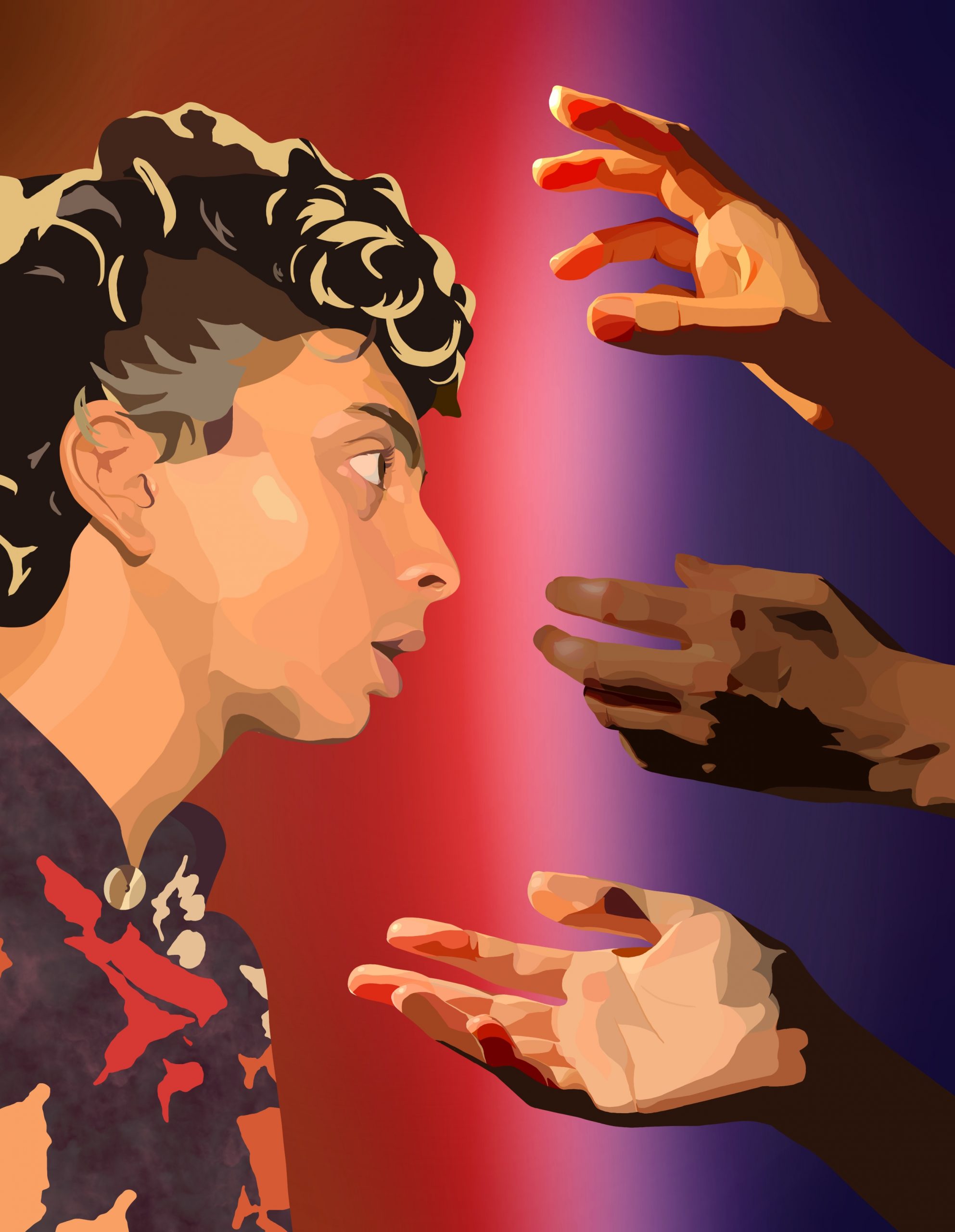Illustrated by Christopher Ikonomou (Xe/He)
This article was originally published in our Winter 2022 Volume 2 print issue “Wanting: A Queer Beauty & Burden.“
**Content Warning: harrassment, violence, queerphobia**
“Honestly, I just saw something in you that made me insecure about myself, and I took it out on you.”
I remember these words searing into my heart as a boy whom I had gone to middle school and high school with apologized to me during his senior year for harassing me throughout middle school. He had recently decided to come out to most of his social circle, including some of the very people he sat alongside with as he messed with my queer friends and me.
As he says these words to me, I reminisce on the younger me. Uncomfortable. Unaware. Untouched. All of these at the same time. I remember the young version of me who felt an outward tension between my femininity and my surroundings. The person who had yet to take note of every gesture, change in posture, or inflection in my voice indicating that something was out of the ordinary.
This is not a letter to this bully or bullies in general, and this is not an “I’m stronger because of him.” I’m undefined by his actions and men like him. I know I’m stronger in spite of them. This is not about ruminating on being queer and not fitting in. In fact, it is the very opposite. In refusing to fit in as our most outward, shining selves, we cast light upon those who hide in the shadows of the cishet binary, peering at our light and attempting to grasp it without wishing to contribute even a spark.
An experience like this is not limited to one group of queer people. However, the aura, the presence of feminity as an outwardly flamboyant gay boy (at the time), was enough to attract violence from those in the shadows. In all of this, I find myself not in a position of lacking forgiveness or swelling in anger, but with a feeling of loss, a sense of yearning to retrace a queer, feminine, free childhood safe from the boundaries of the binary. I yearn for a childhood defined by the sun blazing and sky bright, unaware of the approaching overcast of the clouds.
My issue is not that he sought forgiveness or that he felt guilt for a situation that pained me. I don’t feel a sense of resentment for how he treated me because queerness demands reflection, acting as a mirror to display someone’s own hatred, his own hatred. My issue is that he is not the only one. Boys like him used their hatred to attempt to weaponize my own sexuality. Hearing his words, I remember a group of boys who ended up apologizing after trying to frame me for inappropriate sexual content on school laptops in middle school. Those actions do not belong to these men, they belong to queerphobia and they belong in the category of violence. What is so potent about this hatred, so vile about expressive queerness, that some who eventually claim our community are the ones who hurt us the most?
I see men on TV portrayed as deeply homophobic, violent, and angry, yet in these series are backstories and explanations so often tying back to these men being in denial of their sexuality. I see their redemption arcs, and I see their vindication. All I can think about is those whom they’ve hurt, those whose struggle was a jagged path instead of linear. Those for whom queerness was seen as a starting point to build from, an unstable, but unique, foundation and not a destination.
“I see men on TV portrayed as deeply homophobic, violent, and angry, yet in these series are backstories and explanations so often tying back to these men being in denial of their sexuality.”
I’m not rejecting these men from our community, and I do not want to ignore their pain, their sexuality, or their identity. In fact, to do so would be to replicate the same violence I yearn for us to destroy. Although, I am left with this lingering feeling looming over me that sharing identity is not the same as sharing community, as shown by these men. Queerness in its rawest form cannot explain or justify violence against queer people. The struggles of the binary and queerphobia create this. We are not responsible.
I yearn to be free from the position of storyteller in this cycle. I yearn to see sparks fly in the shadows of the binary that left me falling deep into the abyss, only to be jolted back alive with the blistering reminder that my outward femininity, my outward queerness was a catalyst for violence from my own. I yearn to hope that those who do perpetuate this cycle free themselves from the conflict they feel inside that leads them to inflict this upon people who know their struggle.
My heart sits with those who cannot fall into the softness and stillness of shadows. My heart aches for those who fall into gaps, crevices, and cracks, with rough surfaces breaking their fall instead. For those whom queerness, not just the act of being gay, is an outward default. For those who seek love from men like this, dancing around the violence of their shadows. I yearn for the new shadows that we cast to be intuitively defined, in awe of our queerness instead of in fear of it.
“My heart sits with those who cannot fall into the softness and stillness of shadows. My heart aches for those who fall into gaps, crevices, and cracks, with rough surfaces breaking their fall instead.”
Credits:
Author: Shaanth Kodialam (They/Them)
Artist: Christopher Ikonomou (Xe/He)
Copy Editors: Brooke Borders (She/Her), Emma Blakely (They/She/He)

